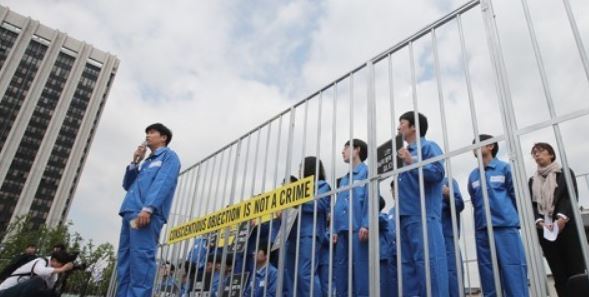INCHEON -- A lower court has acquitted a Jehovah's Witness who refused mandatory military service due to his religious convictions, court records showed Monday.
The 22-year-old, whose name has not been released, was indicted for violating the Military Service Act because he failed to enroll in the military in 2016 after being ordered to report for duty.
In South Korea, all able-bodied men are required to carry out mandatory military service for about two years. The Military Service Act makes it criminal to not report for military duty without a "legitimate reason."

This file photo taken on May 15, 2017, shows a rally in support of conscientious objection in Seoul. (Yonhap)
The man claimed he refused to serve in the military because of his religious faith and conscience.
The Incheon District Court ruled that freedom of conscience is a core basic right and needs to be protected because it is directly linked with the constitutional value of human dignity.
"The defendant and conscientious objectors with religious beliefs intend to carry out noncombat alternative service that is more difficult and longer than military service," Judge Lee Dong-gi said. "His level of violating law and order is different from other draft dodgers."
Lee also said conscientious objectors' decisions are based on respect for life and peace, which are also constitutional values.
South Korea, however, has seen split decisions on conscientious objectors in recent years depending on the judge.
In March, a judge at Incheon District Court found a conscientious objector guilty and handed down an 18-month jail term. The judge then said the punishment is inevitable under current law, which doesn't accept alternative service for military duty by conscientious objectors.
In 2015, three conscientious objectors who were found guilty for draft dodging filed a constitutional complaint on South Korea's military conscription law, and the Constitutional Court is scheduled to deliver its verdict in the near future.
This was the third time that the military conscription law has faced a constitutional challenge by a conscientious objector. The Constitutional Court in 2004 and 2011 ruled that the conscription law is constitutional.
South Korea's legal community said the judiciary atmosphere is changing, but it's still a problem that there are differing decisions on conscientious objectors.
"We are seeing lots of cases in which lower courts give not guilty verdicts to conscientious objectors, and that shows some changes in our judiciary atmosphere," an official with Incheon District Court said anonymously. "But it's a problem that we see different verdicts on the same kinds of cases because of judges' characteristics." (Yonhap)



![[KH Explains] No more 'Michael' at Kakao Games](http://res.heraldm.com/phpwas/restmb_idxmake.php?idx=645&simg=/content/image/2024/04/28/20240428050183_0.jpg&u=20240428180321)


